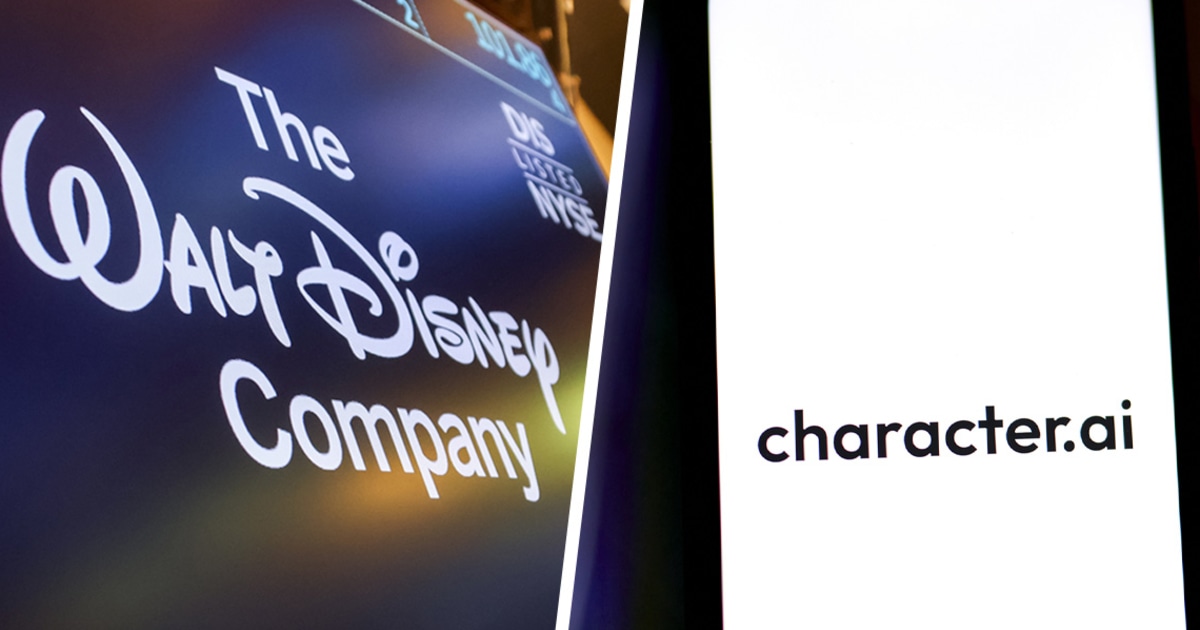Character.AI said Tuesday that it has removed Disney characters from its chatbot platform after the studio asked the developer to stop using its copyrighted characters without authorization.
The studio in Burbank, California, sent a cease-and-desist letter to Character.AI, according to Axios, which was first to report the news, and CNBC.
“In sum, Character.ai chose to systematically reproduce, monetize, and exploit Disney’s characters, that are protected by copyrights and trademarks, without any authorization, in a way that is anathema to the very essence of the Disney brand and legacy,” the letter says, according to Axios.
NBC News has not reviewed a copy of the letter. A spokesperson for Disney did not immediately respond to a request for comment.
In its statement, a spokesperson for Character.AI said it responds “swiftly to requests to remove content that rightsholders report to us. The takedown … was in response to such a request. These characters have been removed.”
Founded in 2021, the California-based chatbot startup offers what it describes as “personalized AI.” It provides a selection of premade or user-created artificial intelligence characters to interact with, each with a distinct personality. Users can also customize their own chatbots.
Princess Elsa from “Frozen,” Moana (the title character in “Moana”), “Spider-Man” alter ego Peter Parker and “Star Wars” villain Darth Vader were some of the user-made Disney characters chatbots impersonated.
“Some of those characters are original creations, and some are inspired by existing characters that people love,” a Character.AI spokesperson said. “It’s like fan fiction, but in an interactive form.”
As of Tuesday evening, when NBC News searched for any of those names on the platform, most of the bots bearing resemblance to Disney’s copyrighted characters seemed to have been removed.
Some characters that were previously available began returning an error message that read: “Something went wrong. Please refresh or try again later.” The characters then became unavailable.
“We want to partner with the industry and rightsholders to empower them to bring their characters to our platform,” the Character.AI spokesperson said. “Our goal is to give IP owners the tools to create controlled, engaging and revenue-generating experiences from deep fandom for their characters and stories, expanding their reach using our new, interactive format.”
Artificial intelligence has continued to be a sticking point in Hollywood. Industry leaders have said its use in film and TV is slowly becoming mainstream, as more filmmakers use evolving AI tools and studios partner with AI companies to explore how they can use the technology in content creation.
But the rapidly evolving technology has stoked concerns among creatives. In 2023, during the writers and actors strikes against studios, creatives sought assurances that their work would not be replaced by the technology.
A handful of copyright owners, including authors, news outlets and music labels, have sued tech companies such as OpenAI, Microsoft and Anthropic over unauthorized use of their content in AI training.
Now, studios also appear to be taking firmer stances regarding copyright infringement and AI models.
Disney, Universal and Warner Bros. Discovery sued China’s MiniMax for copyright infringement this month, Reuters reported, claiming the company’s image- and video-generating service Hailuo AI was built from intellectual property stolen from the studios. (Comcast is the parent company of NBCUniversal, which owns both NBC News and Universal.)
Also this month, Warner Bros. Discovery became the latest studio to sue Midjourney, accusing the AI company of building its business around the mass theft of content. Disney and Universal made similar accusations in their lawsuit against the company, which was filed in June.
Several AI companies, including Character.AI, have also come under fire in the past year for their impact on younger users. At a Senate Judiciary Committee hearing this month, parents and online safety advocates urged Congress to push for more safeguards around chatbots, claiming tech companies designed their products to “hook” children.
Last year, a Florida mom named Megan Garcia sued Character.AI, accusing its chatbots of initiating “abusive and sexual interactions.” In May, Senior U.S. District Judge Anne Conway rejected arguments that AI chatbots have free speech rights after developers behind Character.AI sought to dismiss Garcia’s lawsuit. The ruling means the wrongful death lawsuit is allowed to proceed for now.
Three additional product-liability claim lawsuits were filed against Character.AI this year on behalf of underage users whose families claim it “knowingly designed, deployed and marketed predatory chatbot technology aimed at children,” according to the Social Media Victims Law Center. In one of the suits, the parents of a 13-year-old allege a Character.AI chatbot contributed to their daughter’s suicide in 2023.
According to Axios, in its letter, Disney cited a recent report titled “Sexual Exploitation, Manipulation, and Violence on CharacterAI Kids’ Accounts.”
“Character.ai’s infringing chatbots are known, in some cases, to be sexually exploitive and otherwise harmful and dangerous to children, offending Disney’s consumers and extraordinarily damaging Disney’s reputation and goodwill,” the letter states, according to Axios.
After the congressional hearing this month, Character.AI said it has “invested a tremendous amount of resources in Trust and Safety” over the past year, including a different model for minors, a “Parental Insights” feature and prominent in-chat disclaimers to remind users that its bots are not real people.

